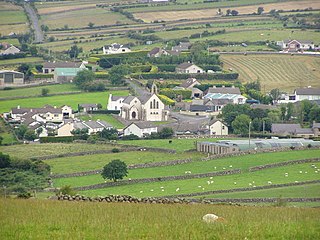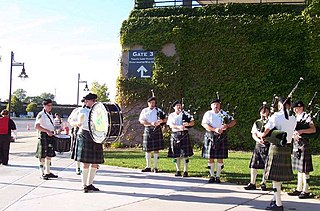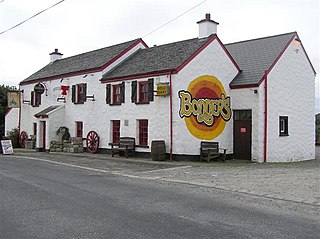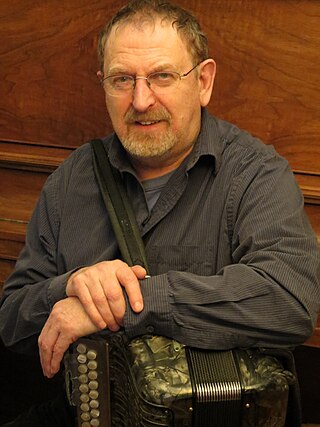
The Fleadh Cheoil, or "music festival" in English, is an annual Irish arts festival and competition run by Comhaltas Ceoltóirí Éireann, or CCÉ, a non-profit organisation which aims to promote the learning of and performance of Irish traditional music and dance internationally and domestically, as the group maintains international branches in several countries.

Cavan is the county town of County Cavan in Ireland. The town lies in Ulster, near the border with County Fermanagh in Northern Ireland. The town is bypassed by the main N3 road that links Dublin with Enniskillen, Ballyshannon and Donegal Town.

Ramelton, also Rathmelton, is a town and townland in County Donegal, Ireland. As of 2016, its population was 1,266.

Attical or Atticall is a small village and townland in the Mourne Mountains of County Down, Northern Ireland. It is situated in the civil parish of Kilkeel and the historic barony of Mourne. In the 2001 Census it had a population of 153 people. It lies within the Newry and Mourne District Council area.

The Shannon Rovers are a pipe band based in Chicago, Illinois. The band plays traditional Irish music almost exclusively. The origins of many of the tunes are lost in antiquity. Centuries ago words were added to many of the melodies and these words provided the names of the tunes as we know them today. The band's signature set, 'Garryowen', 'O'Donnell Abu', and the 'Wearing of the Green' are ancient Irish melodies with words that were composed in the 1700 and 1800s, some of which chronicle events in the 17th century. More recently Garryowen was made famous in this country by Thomas Francis Meagher's Irish Brigade in the Civil War and later by George Custer's Seventh Cavalry.

O' Donnell Park is a GAA stadium in County Donegal, Ireland. The home ground of the St Eunan's club, it is situated between the Letterkenny Regional Sports and Leisure Complex and Ballymacool Park on the outskirts of the town. The Donegal county football team uses O'Donnell Park as a venue for matches.
Fleadh is an archaic spelling of the Irish word fleá, meaning a festive occasion or banquet. It is used by a number of festivals such as The Philadelphia Fleadh, which have an Irish-originated inspiration. It may also refer to:

Irish traditional music is a genre of folk music that developed in Ireland.
Josie McDermott (1925–1992) was a traditional Irish musician: a flute and tin whistle player, composer and singer.

The Irish button accordion has been popular in the Irish music scene in the United States, evolving in parallel with the instrument's progress in Ireland. The players included Irish emigres, locally born Irish-Americans, and also Americans of no Irish descent who played Irish music. Initially the primary instrument was the 1-row 10-key melodeon, later expanding to two- and three-row instruments.

Mullaghduff is a townland in northwest County Donegal, Ireland. It forms part of the greater Rosses region and is officially in the Gaeltacht, however, English is the predominantly spoken language today.

The Kilfenora Céilí Band is one of the oldest céilí bands in Ireland. It was founded in 1909 in Kilfenora, a village in County Clare.

Nell Ní Chróinín is an Irish sean-nós singer from the Muskerry Gaeltacht in County Cork.
The Laichtín Naofa Céilí Band is a former céilí band based in Milltown Malbay, County Clare, Ireland.

Paddy O'Brien is an Irish accordion player and memoirist, author of The Road from Castlebarnagh: Growing Up In Irish Music and creator of the Paddy O'Brien Tune Collection: A Personal Treasury of Irish Traditional Music, the first published oral collection of Irish traditional music.
Paddy O'Brien was an Irish button accordion player and composer. He was instrumental in establishing the B/C style of button accordion playing in Irish traditional music.
Oisín Mac Diarmada is an Irish fiddler.
Martin Talty (Glendine, Milltown Malbay, 10 November 1920 – 16 March 1983 was an Irish uilleann pipes and flute player.
Aidan Connolly is an Irish fiddler and teacher from Dublin. Connolly is known for his unique style of fiddle playing and is a highly sought-after performer both in Ireland and abroad. He has been described by musician Cormac Begley as "one of the best musicians in his generation" and by others as "a leading fiddle player of the current wave of great Irish Traditional music".





















